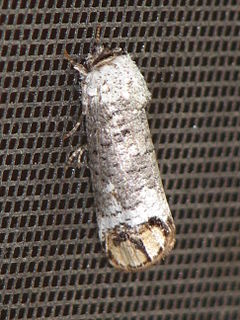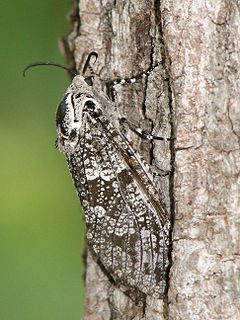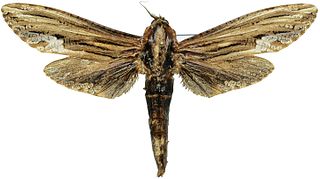Related Research Articles

The Cossidae, the cossid millers or carpenter millers, make up a family of mostly large miller moths. This family contains over 110 genera with almost 700 known species, and many more species await description. Carpenter millers are nocturnal Lepidoptera found worldwide, except the Southeast Asian subfamily Ratardinae, which is mostly active during the day.

The Cossinae are the nominate subfamily of the Cossidae. The caterpillars of several Cossinae species, such as the carpenterworm and the goat moth, are significant pests. On the other hand, in Chile the caterpillars of the Chilean moth are collected on a commercial scale for sale as fishing bait and terrarium pet food; they are usually called "butterworms" in international trade.
{{Taxobox | image = | image_width = | image_caption = | regnum = Animalia | phylum = Arthropoda | classis = Insecta | ordo = Lepidoptera | familia = Elachistidae | genus = Elachista | species = E. cynopa | binomial = Elachista cynopa | binomial_authority = [[Edward Meyrick[Meyrick]], 1897 | synonyms = }} Elachista cynopa is a moth of the family Elachistidae. It is found in Australia in South Australia, Victoria, Tasmania, the Australian Capital Territory and New South Wales. The wingspan is 7.2-8.2 mm for males and 7.6-8.8 mm for females. The forewings are pale grey and the hindwings are grey. The larvae feed on Lepidosperma laterale. They mine the leaves of their host plant. The mine has the form of a somewhat swollen chamber near the leaf tip. Pupation takes place outside of the mine on a leaf of the host plant.

Dyspessa is a genus of moths belonging to the family Cossidae. It was described by Jacob Hübner in 1820.
Catopta is a genus of moths in the family Cossidae.
Semagystia is a genus of moths in the family Cossidae.

The Zeuzerinae are a subfamily of the family Cossidae.
Arctiocossus is a genus of moths in the family Cossidae.
Roepkiella is a genus of moths in the family Cossidae.

Chalcidica minea is a moth in the family Cossidae. It is found in India, Vietnam, Thailand, the Moluccas, Papua New Guinea, Queensland and on the Solomon Islands. The habitat consists of lowland rainforests.

Duomitus is a monotypic moth genus in the family Cossidae described by Arthur Gardiner Butler in 1880. Its only species, Duomitus ceramicus, described by Francis Walker in 1865, is found in Yunnan in China and from southern India and Malaysia to Sumatra, Ceram and New Guinea.
Skeletophyllon is a genus of moths in the family Cossidae.
Trismelasmos is a genus of moths in the family Cossidae.
Panau is a genus of moths in the family Cossidae.
Arctiocossus antargyreus is a moth in the family Cossidae. It is found in Namibia and South Africa.
Arctiocossus castaneus is a moth in the family Cossidae. It is found in South Africa.
Arctiocossus danieli is a moth in the family Cossidae described by Harry Kendon Clench in 1959. It is found in Namibia and South Africa.
Arctiocossus impeditus is a moth in the family Cossidae. It is found in South Africa.
Arctiocossus poliopterus is a moth in the family Cossidae. It is found in Namibia and South Africa.